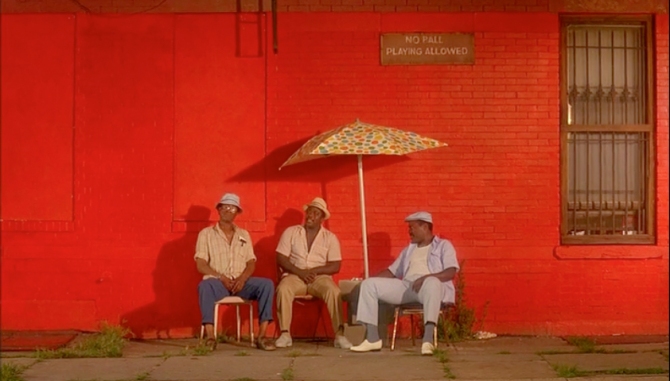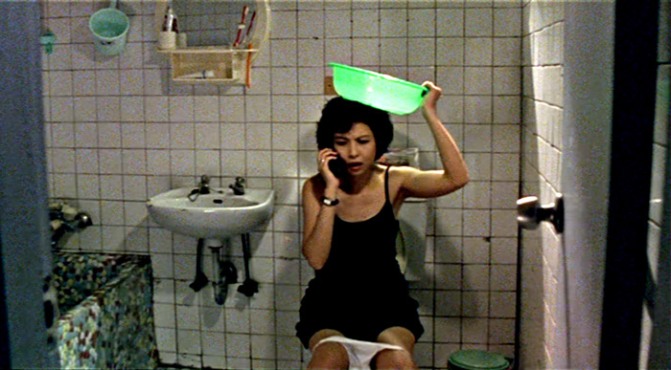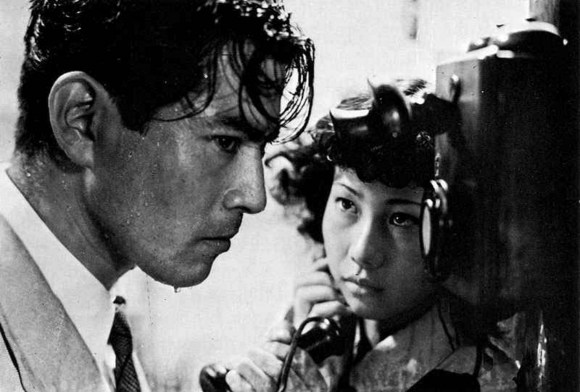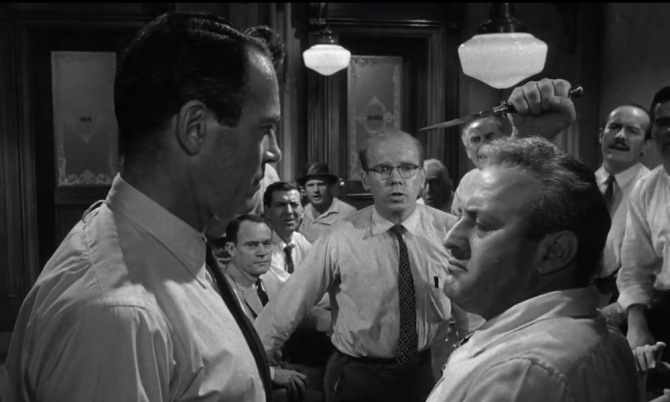New York’s heating up. Sweaty, dank, and humid. Thick, like a swamp. You can feel the air as you walk through it, as it parts to make room for your sagging flesh. Smells are heightened, especially that of rank garbage. We’ve got the heat, so we’ve got less clothes, we’ve got places to move, we can finally step outside and do whatever we please, go wherever we please, but in doing so, we have to bear the claustrophobic crush of all that heat.
New York’s a tough place to be in the summer. Offensive even. Makes me think about some of my favorite sweaty flicks and what sweat can do to a man’s sanity.
The first movie to jump to mind is Spike Lee’s monumental Do the Right Thing (89).
I make it a point to watch Do the Right Thing every summer. Preferably on the hottest day of the year. Usually during the month of July. I put the disk in and blast the AC. Despite the chill, the tundra that expels from my AC unit, I still feel the heat. I feel the color palette as it burns through my TV screen. The harsh reds and oranges and yellows, with a filter set over the lens that burns Bed-Sty even hotter than the hottest George Miller-inspired desert hell. The beads grow thick on Radio Raheem’s forehead as he trounces around with his oversized boom box. I feel the pull in my arm from the heft of his stereo, the sweat pooling beneath my arm pits. I see Sal’s pizzeria, the oven as it blazes and melts tons of cheese, and I feel the noxious smell of pizza creeping up my nose, through my ears, as it searches for the coolest parts of my body, to roast me. I feel the oppressive swelter of the sun that hangs up there in Spike’s sky, a haze of hurt ready to descend and squash everyone that resides on Bed Sty.
The heat’s oppressive. It drives people to hop and twitch and pick petty fights over pictures and radios and D-batteries. It sets their blood to a boil, forces them out of their hotbox apartments and out onto the streets. The day bakes, and people twist ever tighter, ever wilder, ready to lash out.
The powder keg blows when the police finally arrive to break up the climactic fight at Sal’s Famous Pizzeria. The cops—drenched in their fair share of fears and apprehensions and unchecked aggression that flares like the sun—batter through a crowd of slicked up, salted-over bodies, and break up the fight. But at the cost of life. They choke Radio Raheem to death.
And so the riot begins. The oppressed masses blow the fuck up and show the city what’s up. Their temper, their animalism, finally grated to the max by the heat, the cops, the general disregard shown to them by society, by White America, by Institutionalized America, comes to a head when Mookie (Spike Lee) throws a trash can through Sal’s storefront window. The heat demonstrates and magnifies all that which plagues neighborhoods and cities like Bed Sty, Baltimore, Detroit, Compton, East New York, etc. Spike uses heat to stress the anguish, the frustration, to accentuate the disparity between Blacks, Whites, Italians, Koreans, and everyone else who seems to have a beef with one another. Heat angers the soul, it causes it to look outward in an attempt to escape the trappings of our earthly vessels and put the blame on others.
As irrational as that may be, it’s awfully human.
The summer makes me hyper aware of myself, of my flesh, and all its less flattering attributes. When I sweat, I feel the beads as they track the counters of my fat, my excess weight, it cools my skin with goosebumps that chills my spine and, inversely, makes me sweat even more. Grotesqueries abound. People—mostly men—look forward to the ratcheted heat, they assume—rightfully so—that women will systematically shorten the lengths of their skirts and shorts, wear shirts and tops that dip well below the line of “decency”. We see thighs and the bottom curves of women’s butt cheeks, we see a low swath of their cleavage, we see their legs bared, their arms free. But it’s too much flesh, it’s sinking flesh, a flop of flesh. There’s nothing tight about it anymore, it’s like our skin is desperately trying to detach itself from our bone and tendon, to escape the punishing heat.
To me, like Rosie Perez’s Tina, my drive for sex is at an all time low when the summer scorch crawls somewhere above the 80s and there’s no AC in play. The human body is too in flux, too palpably uncomfortable with itself, for me to feel The Urge.
No one epitomizes my concerns with sweaty, human flesh the way director Ming-liang Tsai does. He has this knack for setting his films in environments that could be—and this is putting it lightly—considered soggy and humid. I’ve only seen two of his movies so far—The Rebels of the Neon God (92) and Dong (98)—but the water’s always coming, the rain ceaseless. Water’s either coming up through people’s backed-up pipes or down from the skies, and it floods completely. These people’s worlds—Tsai’s ensemble of characters—is infiltrated by cockroaches and bugs of all kinds, they skirt the water surface, they scuttle about over tiles constantly wet or grimed with moisture that will never dry or evaporate. And it’s hot, too. These people wear nothing more than short shorts and tank tops. And these are young and beautiful people, with long legs, thin legs, young women, young men with tanned, smooth skin. But none of it screams of sex, because their bodies look aggrieved by the sun, the heat, the humidity. Their world is the least conducive setting for sex. It’s too hot, too grimy to feel sexy, to unclothe yourself. It looks like disease and death linger everywhere, incubated by the piss poor elements.
The unnamed “lovers” of Dong feel the physical tyranny of weather so profoundly that they can’t even act on the impulse of sex. They have to fantasize about it through musical numbers, where the world is easier to deal with, where it’s just a touch cleaner and more structured and full of light and glitter that blind the eye from all of reality’s horrors. The lady who lives down below in a constantly flooded apartment finds pleasure, but at a distance, through a phone call to an anonymous plumber. She needs the distance, not the flesh, to get her off, as she’s finally submitted to her tragic position in life.
Then there’s the rage and inadequacy a person is apt to feel when the temperature’s unbearably high. I’m talking about the type of heat that cages us, holes us up in a small, tight space and chisels at our sanity. Several movies come to mind: Stray Dog (49), Apocalypse Now (79), and Twelve Angry Men (57). In all three instances, characters struggle to compensate for their lack of control, their lack of lucidity; it’s as if they’re fighting their inadequacies by shoving their self-perpetuated lies deep inside them. But it doesn’t matter. These lies are bound to break the surface and seep back out through their pores.
Akira Kurosawa, director of Stray Dog, has always loved the heat and rain. The weather in Stray Dog doubles as a perfect representation of the turmoil his leading man, Detective Murakami (Toshiro Mifune), must endure as he searches for his lost gun. The anxiety, as represented by the weather—a trope well worn by Romantic novelists and poets such as Charles Dickens, Emily Bronte, Samuel Coleridge—becomes unbearable for Murakami to handle as his hair and shirt thickens with perspiration—a perfect symbol for Murakami’s crippling, and unrealistic, sense of manhood. The sweat that runs down his forehead embodies wholly his weak constitution.
Captain Willard (Martin Sheen)—the tight lipped anti-hero from Francis Ford Coppola’s Apocalypse Now—first appears to us as chaos incarnate. As the movie opens we see him boozing, karate-chopping, twirling and muttering and crying and bashing his hand open, exorcising his demons with a hedonistic binge of all his worst impulses. Once the mayhem comes to a close, we see Willard cram his ego back inside himself for a very sensitive mission: to find Colonel Kurtz (Marlon Brando, who’s as fat and sweaty as they come) and kill him. You can see the sweat accumulate on Willard’s face, the beads grow fatter, as the film progresses, as if all this violence, all this arbitrary lunacy pent up inside him were fighting as hard as it could to reclaim Willard’s flesh, his earthly self—by oozing through his skin. It oozes as a reminder of his baser self. All that rage in the beginning of the film, tempered by a boat ride, comes to a head as soon as Willard lands upon Kurtz’s compound. Once the illusions of society has crumbled under the heft of Kurtz’s compound, Willard is able to act again, to kill. No more sweat, no more frustration. The build up is gone.
And then you have Sidney Lumet’s Twelve Angry Men:
The room in which the jury deliberates the film’s main case acts as a spiritual brother to the film’s weather, both representing the claustrophobia that comes to test everyone’s patience. The room perspires with irritation. The heat steadily intensifies along with the film’s plot and climax. The case doesn’t break, nor do the withholding jurors who are still convinced of the defendant’s guilt, until the rain comes and washes the tension away. Lumet seems to think we need a good arctic chill to blast our preconceived notions away, to keep us calm and collective, and—ultimately—rational.
I love these movies, I love their tactile nature. Even though New York summers tend to get the better of me and remind me of my physical presence in an unflattering manner, I love films that are set under such disagreeable conditions. It’s the perfect way to create atmosphere, palpability, weight. It’s also a great way to accelerate your plot as well as your characters’ motivations. Nothing spurs a person to act quicker than discomfort. We want what’s best for us, what’s most convenient, and extreme heat is a catalyst to all our conflicts.






















